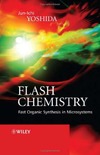Have you ever wished you could speed up your organic syntheses without losing control of the reaction? Flash Chemistry is a new concept which offers an integrated scheme for fast, controlled organic synthesis. It brings together the generation of highly reactive species and their reactions in Microsystems to enable highly controlled organic syntheses on a preparative scale in timescales of a few seconds or less.
Flash Chemistry: Fast Organic Synthesis in microsystems is the first book to describe this exciting new technique, with chapters covering:
- an introduction to flash chemistry
- reaction dynamics: how fast is the act of chemical transformation, what is the rate of reaction, and what determines the selectivity of a reaction?
- examples of why flash chemistry is needed: the rapid construction of chemical libraries, rapid synthesis of radioactive PET probes, and on-demand rapid synthesis in industry
- the generation of highly reactive species through thermal, microwave, chemical, photochemical, and electrochemical activation
- microsystems: What are microsystems and how are they made? Why is size so important? What are the characteristic features of microsystems?
- conduction and control of extremely fast reactions using microsystems
- applications of flash chemistry in organic synthesis
- polymer synthesis based on flash chemistry
- industrial applications of flash chemistry
Flash Chemistry: Fast Organic Synthesis in Microsystems is an essential introduction to anyone working in organic synthesis, process chemistry, chemical engineering and physical organic chemistry concerned with fundamental aspects of chemical reactions an d synthesis and the production of organic compounds.
 |
|
О проекте
|
|
О проекте


